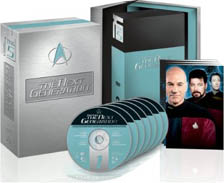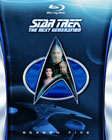Ethics
I've got to throw out an opinion on this episode, as it was the
first of a type of show that screenwriter Ronald D. Moore seemed
to want to champion. The idea was to slow down the pace,
and do longer, slower, deeper scenes with the main characters.
No doubt the budget-saving aspects of this would have appealed
to the producers. I wasn't too keen on it at the time when they
made these shows, since the pace of their faster action-based
episodes felt about right, but in light of today's frenetic TV,
the deeper pace and character scenes seem to be something that
TV should aim for more often now.
The bigger problem with episodes like this is that there really
isn't enough meat to make the scenes as deep as the writer intended.
It's a little too obvious to the audience early on in this one,
for example, that there is an ideal match between the guest star's
risky surgical technique and Worf's glory-or-die cultural philosophy.
The story really isn't going anywhere during the lengthy scenes
that serve to delay their mutual involvement in the surgery.
Some of it is necessary set-up, of course. I just don't see the
value of all those arguments in favour of less-than-ideal solutions,
whether it is Picard saying that Worf can't make the journey
to learn to live as a paraplegic, or Worf arguing for
suicide, or Crusher arguing that a glorious solution is too risky
a road (she should let Worf make that decision for himself,
and simply decide for herself whether or not she is going to
participate in it as a surgeon).
There's also a problem of generalizing,
most notably that because Crusher witnesses Dr. Russell making a
poor choice to side with risk in an early case, she decides
that all of Russell's choices to side with risk must be
equally wrong - and pretends that Russell isn't smart enough
or human enough to learn from her own error.
Though I'm squeamish enough about operations that I wouldn't
recommend as much graphic footage of the actual operation
in the finished program, the conclusion of this episode must
get a few points for making me believe, on first viewing,
that Worf had been killed off on the show. Some of the credit
there must go to the fact that this cast did shake itself up
every year-and-a-half or so, beginning with its loss of
Tasha Yar (which some of this episode echoes), and
continuing with the loss of Wesley Crusher, and the temporary
replacement of Beverly Crusher. The show seemed to be right
on schedule for another main cast shake-up at this point in
season five. Also, the director and the principle actors
pulled off an incredible job here. But in hindsight,
it's a bit of a wasted effort. As we otherwise suspected
from the beginning, the characters all return to their starting
positions again, and if you missed this episode in the season five
run, you'd never have known it. Also, the lameness of this whole
drama being triggered by a loose barrel falling on Worf in the cargo bay
seems so contrived, as if it has been pulled out of nowhere
just to create the hour's cheesy drama.
It's exactly the kind of contrivance
typical of an episode that isn't going to be serious about
making any real changes to the status of the regular characters.
Something more organically related to the character and his choices,
as in "Worf should have known not to tackle that insectoid
on Frickleseamus 2 singlehanded; he should have waited for back-up!"
would have worked better for me as a catalyst event for this drama
and greatly reduced its "pass me the barf bag" factor.
If there's any long term growth here, it simply seems to be that
Brian Bonsall makes his first return to the show to play
Alexander, proving that he's now a recurring presence that
can mix it up with the other regulars and deliver on their level.
Good stuff.
As an episode, this one seemed to take an unnecessarily slow,
overly emotional, and overly complicated route to get to the
obvious, and is not one of Star Trek's greatest. What really
convinced me that this was not the way to do Star Trek was the
next episode attempted in this mold: "The First Duty",
where the Moore pattern of wallowing in the emotional crap of
"loss" became too pronounced to be of good taste,
having too few elements of other flavours to balance
the story. Better character-based long-scene-filled episodes
of sci-fi TV have been done before and since.
|
|








 (regular)
(regular)



